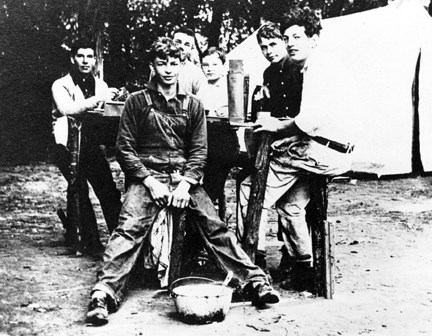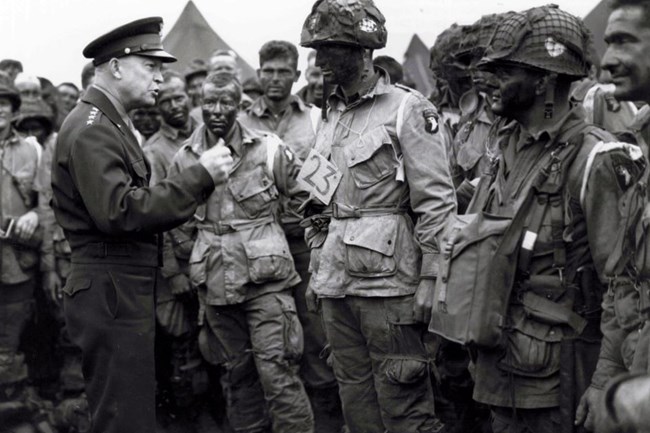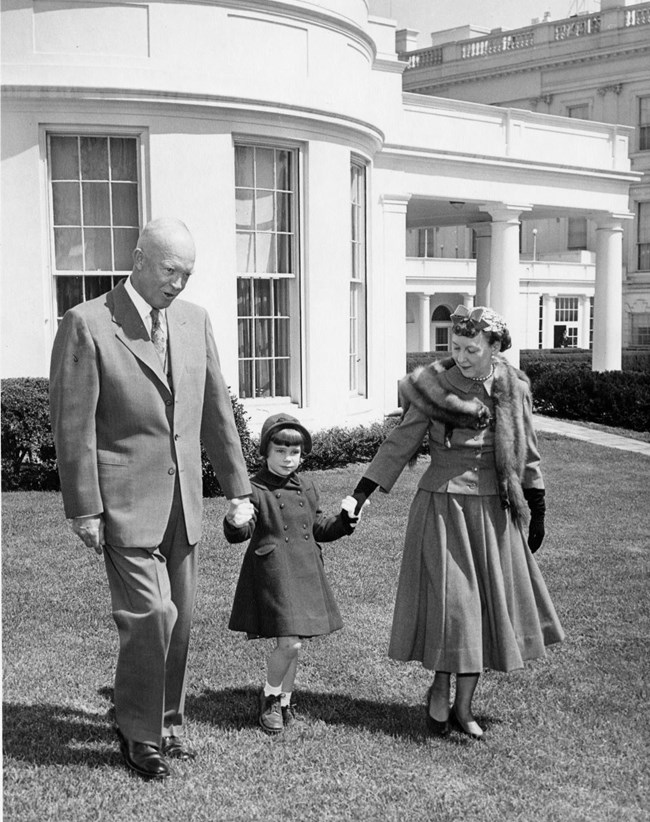"I am from Abilene"
Young Ike loved hunting, fishing, and reading history. He also had a passion for baseball. His work ethic, competitiveness, and ambition would not keep him on the farm for long. Lacking money for college, Ike’s trip out of Abilene was delayed for two years. He worked to allow his younger brother to go to school. Learning that the military academies charged no tuition, Eisenhower took and passed entrance exams for Annapolis and West Point but was too old for the Navy. He won an appointment to the US Military Academy in 1911. Despite Eisenhower’s eventual world travels and positions of power, he frequently returned to Abilene where his dreams of seeing the wider world began and where his family and friends still resided. “The eyes of the world are upon you”
The Army valued Eisenhower for his organizational and coaching skills. Rather than sending him to fight in World War I, he was kept in the US. His first assignment was Fort Sam Houston where he met his future wife Mamie Doud. Later, he trained aspiring officers and ran a tank school. Ike continued to advance his army career, learning, coaching football, and commanding posts throughout the world. On December 7, 1941, Eisenhower’s skills were called upon to fight in World War II. Seen as a natural leader by Army Chief of Staff George C. Marshall, Eisenhower was selected to plan the United States’ war effort. He was then sent to Europe where he forged soldiers, sailors, and airmen from the US and other countries into an effective team. Ike’s diplomacy and determination created a multinational headquarters that controlled British and American units. His forces liberated North Africa, Sicily, and Southern Italy. The culmination of Eisenhower’s work was the D-Day attack on occupied France. On, June 5, 1944, paratroopers jumped from planes while ships and planes bombed the Germans. The next morning, British, Canadian, and American troops stormed ashore from landing craft. US Army Rangers climbed the hundred-foot-tall cliffs at Pointe du Hoc and destroyed an artillery position. Before leaving for the D-Day attack all servicemen received Ike’s “Order of the Day”. He highlighted the battle’s importance. “You are about to embark on the Great Crusade...The eyes of the world are upon you. The hopes and prayers of liberty loving peoples everywhere march with you...We will accept nothing less than full Victory!” Victorious in invading France, Eisenhower’s forces moved across Western Europe into Germany, defeating the Nazis with the help of the Soviet Union. For the rest of his life, Ike remembered the price that his troops paid to preserve democracy. At a D-Day anniversary he visited a Normandy cemetery and said, “these people gave us a chance, and they bought time for us, so that we can do better than we have before.” “We must be ready to dare all for our country”
In his inaugural address, Eisenhower stated, “We reject any insinuation that one race or another... is in any sense inferior or expendable.” He put this idea into action by implementing the integration of the military. He signed the Civil Rights Act of 1957, protecting African American’s right to vote. It was the first civil rights legislation since Reconstruction. Days later, Ike sent 1,200 soldiers to Little Rock Arkansas to make sure nine black students could attend high school. Eisenhower’s first principle for achieving world peace was “abhorring war as a chosen way to balk the purposes of those who threaten us.” As such, he sought to end international conflicts. He brought the Korean War to an unofficial end. When Britain threatened war on Egypt, his team negotiated a peaceful resolution. Eisenhower also took aggressive action. His CIA overthrew elected leaders in Iran, Guatemala, and Congo, fearing Russian influence. “We must be ready to dare all for our country.” While expedient, the US still feels the results of these actions today. Eisenhower also sent high altitude U2 planes to spy on Russia. When one was shot down, Ike claimed it was a stray weather aircraft. After Russia produced the plane’s wreckage and pilot, Eisenhower’s lie was exposed, ending seven years of diplomacy. The Soviet Union sent the Sputnik satellite into orbit in 1957. Countering this threat, Eisenhower created what became NASA. The space race had begun. From this foundation, the US sent men to the moon 12 years later. President Eisenhower finished his two terms of office with a hope for peace and a warning. “We must guard against the acquisition of unwarranted influence... by the military-industrial complex. Only an alert and knowledgeable citizenry can compel the proper meshing of the huge industrial and military machinery of defense with our peaceful methods and goals...” Eisenhower left the White House in 1961 and spent his last eight years at his Gettysburg, Pennsylvania farmhouse. After passing away in 1969, Dwight D. Eisenhower was laid to rest in his hometown of Abilene, Kansas. |
Last updated: June 7, 2024
